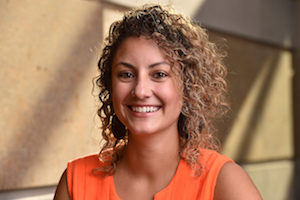Name: Katie Coldwell
E-mail: kcoldwel@nd.edu
Language: Tagalog
Location of Study:
Davao City, Davao Region, Philippines
Program of Study: The Maryknoll Institute for Language and Culture
Sponsors: Center for the Study of Languages and Cultures
A brief personal bio:
Katie earned a B.A. in social welfare & justice and theology from Marquette University. After spending one year living in a Catholic Worker Community, she joined Maryknoll Lay Missionaries in Sao Paulo, Brazil. As Social Services Coordinator for the Instituto Terra, Trabalho e Cidadania, Coldwell and her colleagues provided social and legal services, educational programming and political advocacy on behalf of foreign women incarcerated for international narcotrafficking. Katie also co-founded an urban agriculture project in Brazil’s largest women’s detention facility, Sant’Ana Women’s Penitenciary. Katie has over 7 years of experience working with faith-based non-profit organizations in Uganda, Tanzania, South Africa, Brazil and the United States. She is currently pursuing a Masters in International Peace Studies at the Kroc Institute for International Peace Studies.
Why this summer language abroad opportunity is important to me:
From July – December of 2016, Katie will be partnering with Catholic Relief Services (CRS) as they implement Bridging Relationships through Interreligious Dialogue in Mindanao (BRIDGE Mindanao) in Mindanao, Philippines. Bridge Mindanao will work with key leaders in Christian, Muslim and Indigenous communities located in the most violence-prone and polarized areas in Mindanao. BRIDGE Mindanao will facilitate interactions between and within groups who can most directly and positively contribute to peacebuilding efforts and peaceful political transition.
Because Tagalog is the primary language used to facilitate these dialogues, studying the language prior to beginning the internship will allow her to make important contributions to the peace-building process with CRS.
What I hope to achieve as a result of this summer study abroad experience:
Having a baseline understanding of Tagalog will allow Katie will be able to make contributions to BRIDGE Mindanao. These contributions consist of mapping and profiling dialogue and reconciliation efforts and interreligious networks and groups in Muslim and Christian communities. Katie will also be documenting success stories and good practices of reconciliation in these communities. Katie will use learning documentation practice to collect findings and produce a peacebuilding assessment for CRS and local partner organizations. Learning Tagalog will make Katie an asset to CRS’s peacebuilding program in Mindanao.
My specific learning goals for language and intercultural learning this summer:
- By the end of my time at the Philippines, I will be able to communicate in Tagalog with native speakers about topics of local cultural importance.
- By the end of my time in the Philippines, I will be able to listen and speak proficiently in Tagalog with co-workers on issues related to peace building.
- By the end of my time in the Philippines, I will be able to demonstrate significant tolerance for ambiguity and a willingness to take intercultural risks by engaging in cultural and linguistic interactions that are beyond my level of mastery and comfort zone.
- By the end of my time in the Philippines, I will be able to recognize and utilize Tagalog in order to conduct research for my masters Capstone project.
- By the end of my time in the Philippines, I will be able to support and document focus groups and key informant interviews in Tagalog.
My plan for maximizing my international language learning experience:
The Beginners Tagalog Course has a class schedule allows me to participate in comprehensive language training. I will begin language study immediately upon arrival in Manila. I will be able to complete 4 full weeks of language training before my internship start date on July 1st, 2016. This timeline allows me to focus exclusively on learning the language. I will also be living with a host family, allowing me to be fully immersed in the language as I am taking lessons. Living with a host family will also provide me with the cross-cultural immersion necessary to better adapt to the local culture.
